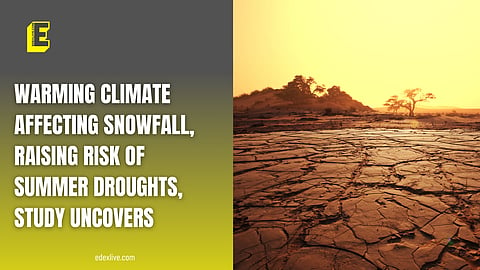

According to new research, across the Northern Hemisphere, declining snowfall is affecting seasonal river flows, thereby, increasing the risk of summer droughts. This was stated in a report by PTI.
Researchers explained that this could threaten water and food security, ecosystems and hydropower generation.
The team, led by researchers from the University of Bristol, United Kingdom (UK), found that as the planet warms, snowy regions in the rocky mountains of North America, and the Alps in Europe, are melting prematurely.
Further, seasonal stream flows in less snowy areas are delayed as winters are becoming drier and warm-season rain arrives later in the year, becoming a more dominant source of river flow, they explained.
"The increased (year-on-year) variability of streamflow seasonality implies greater uncertainty in seasonal streamflow patterns, posing challenges for water resource planning and management," said Ross Woods from the University of Bristol and lead author of the study published in the journal, Nature.
For the study, the researchers looked at climate and river flow data from 1950-2020 for more than 3,000 river basins across the Northern Hemisphere.
For every year, they calculated the amount of precipitation falling as snow, how this amount changed with time, along with its timing in every season, and river flows.
As climate around the world warms, seasonal river flow peaks tend to decrease, thereby, resulting in a more uniform river flow over the entire year, said the researchers.
The timing and seasonal changes of river flows showed greater year-on-year changes with declining snowfall, which means planning for these changes in the future is essential, said Woods.
Previous studies have shown that with climate change, snowfall is reducing, snowpacks are changing and the river flows resulting from meltwater are also changing.
